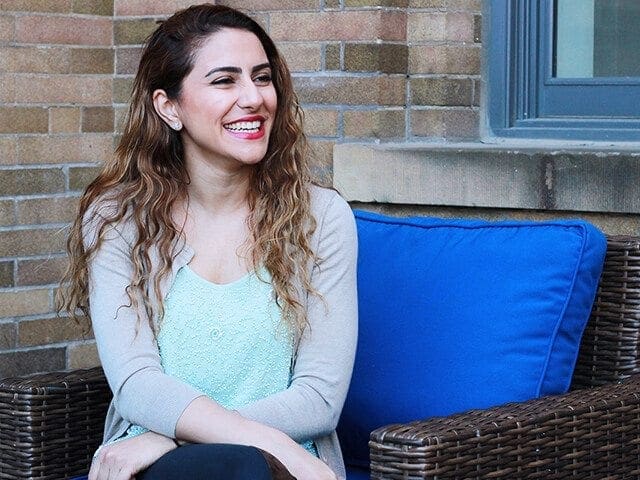#HumansofMaRS: TranQool moves therapy sessions online

From the outside, it seemed as though Chakameh Shafii had the perfect life.
“I had just graduated, I had a really good paying job, I had friends,” she says, “but I also had anxiety.”
At its worst, Chakameh’s anxiety gave her headaches and interfered with her work life. After a recommendation from her aunt, she decided to give cognitive behavioural therapy (CBT) a try. It was life changing.
“It gives you coping skills—and not just skills to manage your emotions. It also gives you the skills to understand your own personal values, what makes you happy and what doesn’t,” Chakameh explains. “It’s kind of like getting a PhD in yourself.”
She told her friends about the experience and encouraged them to try CBT, but they all gave her similar responses: therapy is too expensive and too inconvenient, and it’s too hard to find a therapist that you actually like. So Chakameh decided to do something about these barriers.
“It was a no-brainer for me,” she says.
She started by reaching out to a friend, Saeed Zeinali, who was working as a manager at an oil and gas company. He was also experiencing difficulty accessing therapy to help him deal with the stress caused from working 12-hour days and travelling a lot for work.
“Mental health services are one of the things that you think you have access to until you actually try to access them,” says Saeed. “It was so inconvenient and chaotic for me. It was really clear to me that there was a problem because I felt it myself.”
Saeed immediately got on board with Chakameh, as did their co-founder Babak Shahabi. Together the threesome built TranQool, a platform that connects patients to licensed CBT therapists via video sessions. The platform also allows users to track their progress and to complete assignments.
“By breaking the barriers of how you can access your therapist and how you can access materials to do your therapy, you make it one step easier for people to commit to it and to continue to go back to it,” says Chakameh, the CEO of the company.
TranQool’s video sessions are encrypted and compliant with the Personal Health Information Protection Act. It costs $80 for a 45-minute session, which is covered by health insurance plans. The platform also helps patients navigate the therapy process by matching them with a therapist based on their language and particular needs. TranQool’s therapists can help with issues including low mood, anxiety and stress, sleeping problems, eating disorders and a range of other mental health problems.
Through their initial research, the TranQool co-founders discovered that the three main reasons people do not seek therapy are accessibility, affordability and inconvenience, so they built the platform to address those barriers. But it wasn’t until one of their first users provided feedback on their first therapy session that the team understood just how impactful TranQool could be.
The user wrote a long email to Chakameh explaining that they’d had trouble seeing a therapist in the past because the process was too onerous. First you have to see your family doctor to get a referral, a process that can take a couple of months. Then, once you finally get an appointment with a therapist, you often have to wait a few more weeks before you actually get to see them.
“The customer never actually ended up going to see a therapist because the whole process took four months and they just couldn’t do it,” says Chakameh.
Using TranQool, the same customer got to see a therapist within 24 hours, which they said was really helpful.
“I sent the feedback to my team and was like, ‘Guys, if we go bankrupt tomorrow, we just helped one person to this extent, so I think we’ll be happy,’” says Chakameh. “That was the point where we said ‘We have to do this. We have to make this accessible to everyone.’”
The TranQool team wants their platform to be the go-to choice for everyday people who want to care about their emotional well-being, says Saeed. “It’s a place they can go to if they want to feel better,” he says.
They don’t want the experience to feel too clinical, though.
“One of our early adopters said that TranQool feels like an extension of their home,” says Babak, the product lead for the company. “This is the kind of platform that people will come on when they’re probably not having their best day,” he explains, so it’s important that it calms and comforts them.
Chakameh hopes that everyday people will find the same value in CBT as she did.
“For me, therapy was about finding ways to actually enjoy life and that’s why I started telling everyone about it,” she says. “If a person can talk to themselves in the mirror and say ‘I know what makes me happy,’ that’s where we want everyone to be.”
 Jordan Adams
Jordan Adams